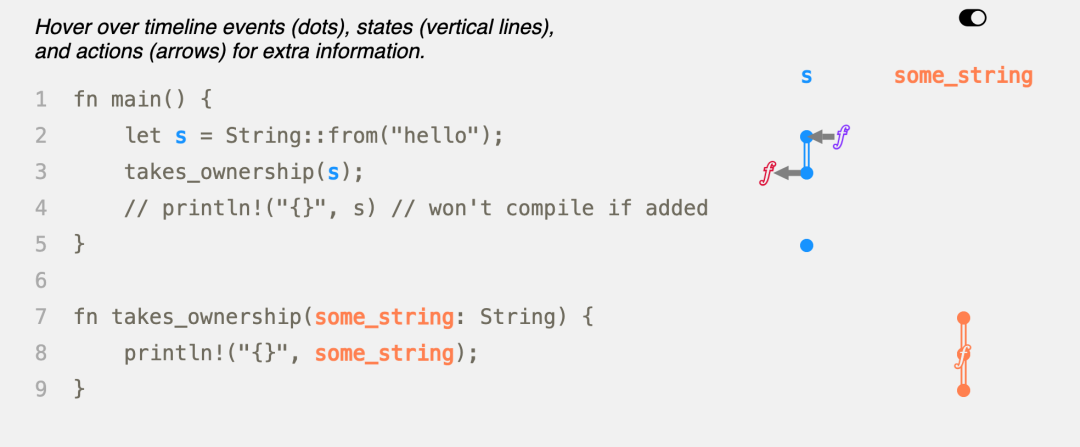Rust 让人迷惑的 “借用”
本篇尽量深入浅出,不想学 Rust 的也可以读读,多种语言对比很有很大的收获,Go 再好也不是所有场景通吃^_^
上周分享了[Rust Ownership 三原则] , 要谨记这三点:
- 每个值 value, 都有一个所有者 owner
- 同一时间,一个值只能有一个所有者 owner
- 当所有者 owner 离开作用域,对应的值会自动 dropped
hello 是在堆上分配的字符串,owner 是 s, 当以参数传给函数 takes_ownership 后,所有权 Move 给了 some_string. 也就是当函数返回时 hello 字符串会被 dropped,所以 main 第 4 行如果打印 s 会报错,因为己经 Move 走了
如果 main 想继续打印 s 怎么办呢?takes_ownership 可以将 hello return 出去,这样 owner 会再度 Move 给 s. 但真的很不方便
引用介绍
这时引用出场了,不移动所有权,只出借数据
fn main() {
let s = String::from("hello");
no_takes_ownership(&s);
println!("main {}", s)
}
fn no_takes_ownership(some_string: &str) {
println!("func {}", some_string);
}zerun.dong$ cargo run
Compiling hello_cargo v0.1.0 (/Users/zerun.dong/code/rusttest/hello_cargo)
Finished dev [unoptimized + debuginfo] target(s) in 1.86s
Running `target/debug/hello_cargo`
func hello
main hello上面是经过改造后的代码,运行都可以打印,但是 no_takes_ownership 并没有拥有 owner, &str 表示对字符串的只读引用。no_takes_ownership(&s), 这里没有直接写 s, 而是取引用 &s
指针与引用
fn main() {
let a = 0;
let _r = &a;
}上面是最简单的引用例子,a 是一个 int32 类型,值为 0. 然后 _r 是对 a 的引用
Dump of assembler code for function hello_cargo::main:
src/main.rs:
1 fn main() {
0x000055555555b6c0 <+0>: sub $0x10,%rsp
2 let a = 0;
0x000055555555b6c4 <+4>: movl $0x0,0x4(%rsp)
3 let _r = & a;
=> 0x000055555555b6cc <+12>: lea 0x4(%rsp),%rax
0x000055555555b6d1 <+17>: mov %rax,0x8(%rsp)
4 }
0x000055555555b6d6 <+22>: add $0x10,%rsp
0x000055555555b6da <+26>: retq
End of assembler dump.可以看到 a 变量分配在栈上 rsp + 0x4, 初始值是 0, 然后第 3 行反汇编可以看到,lea 取了 a 的地址,然后将地址传递给栈上的 _r
本质上 rust 引用和普通的指针区别不大,只是在编译阶段,附加了各种规则而己,比如引用的对像不能为空
借用规则
引用 (reference) 不获取所有权,坚持单一所有者和单一职责,解决了共享访问障碍。按引用传递对象的方式称作借用 (borrow), 这比转移所有权更有效
- 一个引用的生命周期,一定不会超过其被引用的时间。这显而易见的,为了防止悬垂引用
- 如果存在一个值的可变借用,那么在该借用作用域内,不允许有其它引用(读或写)
- 没有可变借用的情况下,允许存在多个对同一值的不可变借用
fn main() {
let y: &i32;
{
let x = 5;
y = &x;
}
println!("{}", y);
}zerun.dong$ cargo run
Compiling hello_cargo v0.1.0 (/Users/zerun.dong/code/rusttest/hello_cargo)
error[E0597]: `x` does not live long enough
--> src/main.rs:5:13
|
5 | y = &x;
| ^^ borrowed value does not live long enough
6 | }
| - `x` dropped here while still borrowed
7 |
8 | println!("{}", y);
| - borrow later used here
error: aborting due to previous error这个例子执行会报错,原因显而易见,y 要引用变量 x, 但是 x 在语句块 {} 中,离开这个词法作用域后就失效了,y 就成了悬垂空引用肯定不行。
fn main(){
let mut a = String::from("hello");
let a_ref = &mut a;
println!("a is {}", a);
a_ref.push('!');
}zerun.dong$ cargo run
Compiling hello_cargo v0.1.0 (/Users/zerun.dong/code/rusttest/hello_cargo)
error[E0502]: cannot borrow `a` as immutable because it is also borrowed as mutable
--> src/main.rs:4:25
|
3 | let a_ref = &mut a;
| ------ mutable borrow occurs here
4 | println!("a is {}", a);
| ^ immutable borrow occurs here
5 | a_ref.push('!');
| ----- mutable borrow later used here上面的代码,a_ref 是可变借用,然后调用 a_ref.push 修改字符串,同时第 4 行要打印原来的 owner a, 这时报错
原因在于,**a_ref 是可变借用,在他的作用域内,不允许存在其它不可变借用或是可变借用,这里 println! 是对 a 的不可变借用**
我一开始困惑的点在于,这个作用域到底有多大!!!远古版本是词法作用域,后来改进了,变成第一次借用开始,直到最后一次调用结束,这样作用域小很多
官方 doc 也有说明,请参考 Non-lexical lifetimes
fn main(){
let mut a = String::from("hello");
let a_ref = &mut a;
a_ref.push('!');
println!("a is {}", a);
}zerun.dong$ cargo run
Compiling hello_cargo v0.1.0 (/Users/zerun.dong/code/rusttest/hello_cargo)
Finished dev [unoptimized + debuginfo] target(s) in 1.51s
Running `target/debug/hello_cargo`
a is hello!经过修改之后,把 println 放到 push 后面就可以了
容易困惑的点
一个结构体里也会有引用,初学都很容易晕
struct Stu{
Age: int32
Name: &str
}这里面 Name 是一个字符串的引用,所以实例化的 Stu 对象没有 Name 的所有权,那么就要符合上面的借用规则。说白了,就是内存谁负责释放的问题
还有一个是类型的方法,第一个参数要写成 &self 或是 &mut self, 如果写成 self 那么函数就会捕捉类型的所有权,函数执行一次,就无法再使用这个类型
struct Number{
num: u8
}
impl Number {
fn get_num(self) -> u8 {
self.num
}
}
fn main(){
let num = Number{num:10};
println!("get num {}", num.get_num());
println!("get num {}", num.get_num());
}上面代码很简单,Number 类型有一个 get_num 方法获取变量 num 值,但是 main 如果调用两次 println 编译时就会报错
zerun.dong$ cargo run
Compiling hello_cargo v0.1.0 (/Users/zerun.dong/code/rusttest/hello_cargo)
error[E0382]: use of moved value: `num`
--> src/main.rs:15:28
|
13 | let num = Number{num:10};
| --- move occurs because `num` has type `Number`, which does not implement the `Copy` trait
14 | println!("get num {}", num.get_num());
| --------- `num` moved due to this method call
15 | println!("get num {}", num.get_num());
| ^^^ value used here after move
|
note: this function consumes the receiver `self` by taking ownership of it, which moves `num`
--> src/main.rs:7:16
|
7 | fn get_num(self) -> u8 {
| ^^^^可以看到编译器给了提示,因为 get_num(self) 定义为 self 就会 takeing ownership, which moves num
所以类型方法的第一个参数要用引用,写 Go 的人肯定容易晕。同理还有 match 的匹配语句块,也会 move 对像,需要引用
小结
在学 rust 时如果有困惑,一定要记住,所有权,借用与生命周期就是为了保证内存安全。Go 语言有 GC 可以自动清理垃圾,而 rust 为了零运行时成本,把这一部分工作移到编译期
